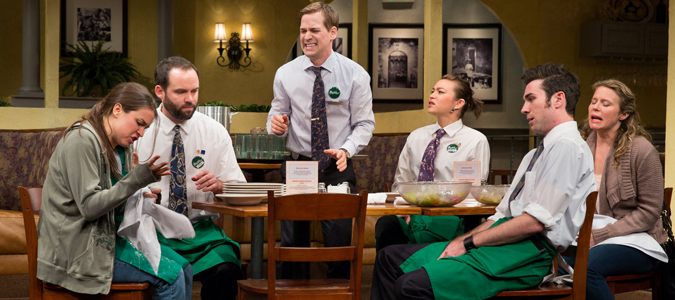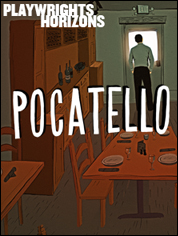

Pocatello
Opening Night: November 21, 2014
Closing: January 4, 2015
Theater: Playwrights Horizons
Eddie manages an Italian chain restaurant in Pocatello—a small, unexceptional American city that is slowly being paved over with strip malls and franchises. But he can’t serve enough Soup, Salad & Breadstick Specials to make his hometown feel like home. Against the harsh backdrop of Samuel D. Hunter’s Idaho, this heartbreaking comedy is a cry for connection in an increasingly lonely American landscape.
BUY TICKETSREAD THE REVIEWS:
December 15, 2014
“Towns aren’t much different nowadays, Becky,” Korean War veteran Cole tells his granddaughter, a moody and intelligent teen who plans on hightailing it from her crummy little town as soon as she reaches her majority. In an America where every exit on the interstate has the same cluster of big-box stores and chain restaurants, will her other options be significantly better? Samuel D. Hunter sheds revealing light on that America (the one we live in today, about which many New Yorkers are blissfully unaware) in his heartbreaking and timely new play, Pocatello, now making its world premiere atPlaywrights Horizons. Eddie (T.R. Knight) is the manager of an Italian-themed chain restaurant in Pocatello, Idaho. He oversees a meager staff of three servers: recovering meth addict Max (Cameron Scoggins), the inscrutable Isabelle (Elvy Yost), and former paper mill worker Troy (Danny Wolohan). A festive banner declares it “Famiglia Week,” but it’s embarrassingly obvious that this is just a desperate attempt to boost attendance at the struggling eatery. In fact, the only customers seem to be related to the staff. Eddie’s mother, Doris (Brenda Wehle), sits at a table with her other son Nick (Brian Hutchison) and his wife, Kelly (Crystal Finn). Nick is a successful real estate agent in St. Paul, Minnesota. This is his first trip back to his hometown in a long time. He wonders why Eddie hasn’t left yet. Troy’s wife, Tammy (Jessica Dickey), daughter Becky (Leah Karpel, deftly playing the seed of an interesting person encased in bitter teenage fruit), and father Cole (Jonathan Hogan) occupy a nearby booth before an unexpected eruption by Becky makes it necessary for them to leave.
READ THE REVIEWDecember 15, 2014
Writer Samuel D. Hunter has taken us through Idaho’s Hobby Lobbys (A Bright New Boise), trucker-newsletter headquarters (The Few), and nursing homes (Rest), not to mention the living environs of a 600-pound recluse (The Whale) in said state, but Pocatello (playing at NYC’s Playwrights Horizons through Jan. 4)—the latest in Hunter’s observant and increasingly prolific ‘write what you know’ Northwest adventure series—has a milieu that just about anyone can relate to: the dreaded chain restaurant. Eddie (movingly played by Grey’s Anatomy star T.R. Knight) is a meek, gay general manager of an unnamed Italian restaurant brand (whose green aprons definitely lean toward The Olive Garden), furiously trying to drum up business after nearby eateries have thrown in the towel. We’re in the midst of Famiglia Week—a promotion in which the staff’s families dine out—which turns out to be more like Hell Week as tensions escalate in the tacky, plastic grape-strewn establishment (the startlingly accurate scenic design by Lauren Helpern practically makes you want to order breadsticks). Troy (Danny Wolohan), an eight-years-in-the-trenches server, is dealing with his senility-afflicted father (Jonathan Hogan) and is on the outs with alcoholic wife Tammy (Jessica Dickey). Their daughter Becky (Leah Karpel) is a downbeat teen activist whom Eddie allows to work part-time as a busser assisting waitstaff, who also include a former meth-head (Cameron Scoggins) and a flighty, young retail vet (Elvy Yost) who seemingly makes up her own rules. Plus, Eddie’s estranged family is fully in tow for the first time in years: an older brother (Brian Hutchison) who despises his smalltown roots, and their skittish, remote mother (Brenda Wehle), whom Eddie desperately wants to be close to again after family tragedy drove them apart years back.
READ THE REVIEWDecember 15, 2014
Samuel D. Hunter, who this year was awarded a MacArthur fellowship, one of the country’s most prestigious and lucrative arts grants, writes with uncommon empathy about characters struggling with spiritual and emotional isolation in the Idaho settings where he grew up. Despite his plays’ regional specificity, theatergoers from across America, and indeed much of the world, will recognize the escalating loss of identity triggered as mom-and-pop businesses make way for franchises and soulless strip malls. T.R. Knight gives raw, wrenching life to a man in the melancholy grip of that malaise in Pocatello, but this is a minor entry from the rising-star playwright. It’s tough to dramatize abject stasis, and while Hunter skillfully built emotional urgency and narrative momentum into more distinctive plays like A Bright New Boise and The Whale, this new work remains muted and numbingly downbeat despite its concluding note of hope. Even if it’s a disappointment, however, there’s much to appreciate in the writer’s honest observations and compassionate human insights, as well as in the sensitive production of his regular collaborator, director Davis McCallum. Knight plays Eddie, the local manager of an Italian chain restaurant in the eponymous Idaho town. The family-dining franchise is never named, but as designed with pinpoint-accurate, bland hominess by Lauren Helpern, the faux-Tuscan decor will suggest Olive Garden even to people who’ve never been closer to one than the TV commercials. It’s indicative of the depths of the town’s depression that this affordable soup-salad-and-breadsticks emporium can’t hack it in the stagnant economy. But despite getting a firm closing date from corporate, Eddie has not informed his staff they’re about to be unemployed. He’s still hoping in vain that business will pick up enough to reverse the decision.
READ THE REVIEWDecember 15, 2014
Samuel D. Hunter’s sincere but static play, Pocatello, starring T.R. Knight. The Grey’s Anatomy alum plays Eddie, manager of a chain restaurant much like Olive Garden in a deeply depressed town in Idaho. The killer economy has wrought havoc. The business is going under. So is Eddie, who’s rooted to his hometown. Like the area, which has lost all trace of history and character amid the same-old big-box stores, Eddie’s sense of self and hope has gone missing. “I don’t know where I live anymore,” Eddie laments a bit too baldly in Hunter’s atypically obvious script. Eddie can’t look to his family for directions. His mother, Doris (Brenda Wehle), who lives near him, is all ice and disapproval. His brother Nick (Brian Hutchison) and his wife, Kelly (Crystal Finn), want nothing to do with Eddie or Pocatello.
READ THE REVIEWDecember 15, 2014
Toward the conclusion of Samuel D. Hunter’s Pocatello, an old-fashioned drama about dead-end lives, an unhappy restaurant manager played by T. R. Knight laments the interchangeability of American towns. He describes the monotonous vista he sees driving home — punctuated by the sights of a Starbucks, a Walmart, a Burger King — and says wearily, “I don’t know where I live anymore.” At that moment, I couldn’t help identifying with this sad sack, and not just because Mr. Knight seems so emotionally invested in his role. All through the production, which opened on Monday night at Playwrights Horizons under the direction of Davis McCallum, I kept envisioning a similar terrain. But my landmarks weren’t chain restaurants and big-box stores. Instead, I saw books, movies and plays stretching back to the beginning of the 20th century, dotting an unending plain of small-town American loneliness: works like Sherwood Anderson’s Winesburg, Ohio; William Inge’s Picnic; the film of Larry McMurtry’s The Last Picture Show; and Neil LaBute’s Reasons to Be Pretty. The melancholy ghost of Inge seemed especially present. And there were moments, whenever a contemporary reference like Best Buy or Applebee’s came up, that I found myself startled to realize that we weren’t back in the conformist heyday of Inge and Eisenhower. Pocatello suggests that while the brand names may have changed, the blues sung by quietly desperate middle Americans still have the same old lyrics. Listen, for example, to the plaint of an alcoholic housewife, portrayed by Jessica Dickey, who married young and now sees that her chances of escaping from her straitjacket marriage are slim: “I mean, there are plenty of unhappy people in the world. Why should we be the ones who get to be happy?”
READ THE REVIEW





















